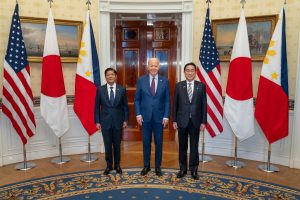The foreign and defense ministers from Japan and the Philippines will meet in Manila next week for talks, including possible negotiations on a defense pact that would allow their militaries reciprocal access to the other nation.
In a statement Friday, the Philippine Department of Foreign Affairs (DFA) announced that Japanese Foreign Minister Kamikawa Yoko and Defense Minister Kihara Minoru will meet their Philippine counterparts on July 8 for a 2+2 meeting. The DFA said the four ministers “are expected to discuss bilateral and defense and security issues affecting the region and exchange views on regional and international issues.”
Japan and the Philippines are reportedly in the process of brokering a reciprocal access agreement (RAA) similar to the existing Visiting Forces Agreement between the Philippines and the United States. The agreement would simplify the bureaucratic hurdles required in allowing troops from Japan and the Philippines to enter each other’s territory for joint exercises and other cooperative activities.
The DFA’s statement did not specifically mention the RAA, but it was widely reported that this would be on the agenda in some form during the 2+2 meeting. The Associated Press paraphrased two officials as saying that “efforts were underway to finalize a key defense pact which they hope could be signed during the meetings.”
The RAA was first discussed during Kishida’s visit to the Philippines last year, when the two sides agreed to begin negotiations. During a return visit to Tokyo in December, Marcos said that the RAA was an “extremely significant” step that would give the two sides “greater capability in terms of not only security but also in terms of disaster preparedness, alleviation, and adjustment.” In April, National Security Council Assistant Director General Jonathan Malaya said that the two sides were hoping to sign an agreement by the end of 2024, raising the possibility that they might do so during next week’s meeting.
In an article on Friday, Reuters quoted Onodera Itsunori, a Japanese member of parliament and former defense minister who visited the Philippines this week along with two other lawmakers, as expressing hopes that an RAA pact will “make rapid progress” during the upcoming meeting.
The obvious spur to the conclusion of an RAA is the deteriorating security situation in the South China Sea, where the China Coast Guard (CCG) has increased both the frequency and intensity of its incursions into Philippine waters since President Ferdinand Marcos Jr. took office two years ago yesterday. China has focused its efforts on preventing the Philippine Navy from resupplying its garrison at Second Thomas Shoal, a Philippine-occupied feature in the Spratly Islands. This has resulted in a series of dangerous high-seas encounters, including an incident on June 17 in which eight Filipino personnel were injured, one of them severely.
The intensifying Chinese pressure campaign at Second Thomas Shoal and other parts of the Spratly Islands has pushed the Marcos administration to deepen its security cooperation with allies and partners, including the United States and Japan. This culminated in April with the holding of the Japan-U.S.-Philippines Summit in Washington, at the close of which the three nations “concurred to continue strengthening security and defense cooperation including through dialogues among defense authorities and joint exercises, as well as maritime safety cooperation.”
Prior to that, Japan had already joined in joint patrols of the South China Sea, and has frequently condemned China’s aggressive turn. After the June 17 incident, the Japanese Foreign Ministry expressed its “serious concern over repeated actions which obstruct freedom of navigation and increase regional tensions.”
In the case of Japan and the Philippines, the two nations see a clear parallel in the maritime disputes that they face with China, which has prompted a gradual strategic convergence over the past decade – one that has only gathered pace under Marcos.
“I believe the Philippines and Japan have something in common,” the MP Onodera said, according to Reuters. “We oppose any attempts to unilaterally change the status quo.”
If signed, the RAA would be Japan’s first with a Southeast Asian nation, and third overall, after agreements with Australia and the United Kingdom. Japan and the U.S. also have a similar arrangement under the Status of Forces Agreement that they signed in 1960.

































